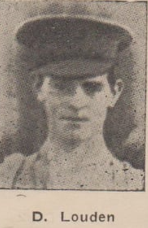
LOUDEN, David
| Service Number: | 220 |
|---|---|
| Enlisted: | Not yet discovered |
| Last Rank: | Private |
| Last Unit: | 41st Infantry Battalion |
| Born: | Edinburgh, Scotland , date not yet discovered |
| Home Town: | Mount Alford, Scenic Rim, Queensland |
| Schooling: | Not yet discovered |
| Occupation: | Farmer |
| Died: | Killed in Action, France , 7 March 1917, age not yet discovered |
| Cemetery: |
Cite Bonjean Military Cemetery, Armentieres IV F 9 |
| Memorials: | Australian War Memorial Roll of Honour, Boonah War Memorial, Brisbane 41st Battalion Roll of Honour, Mount Alford State School War Memorial |
World War 1 Service
| 18 May 1916: | Involvement Private, 220, 41st Infantry Battalion, --- :embarkation_roll: roll_number: '18' embarkation_place: Sydney embarkation_ship: HMAT Demosthenes embarkation_ship_number: A64 public_note: '' | |
|---|---|---|
| 18 May 1916: | Embarked Private, 220, 41st Infantry Battalion, HMAT Demosthenes, Sydney |
Narrative
David Louden #220 41st Battalion
David Louden and his brother Edward presented themselves for enlistment on 28th December 1915 in Brisbane. The boys had been born in Edinburgh, Scotland and probably emigrated to Australia when they were beyond school age as neither is listed as a pupil of Mt Alford Sate School.
Both David, aged 18 and Edward aged 19, gave their address as Mt Alford via Boonah and stated their occupations as farmers. The brothers reported to Bell’s Paddock at Enoggera and were then allocated to the 41st Battalion which was then being raised as part of the 11th Brigade of the 3rd Division AIF. The embarkation roll of the 41st Battalion on the “Demosthenes” in Sydney in May 1916 lists Edward #215 and David #220. The boys had allocated 4/- each from their daily pay to their widowed mother.
In early 1916, the AIF was going through an enormous expansion. Two divisions in Egypt were being expanded to create four divisions which would be sent to the western front. A further division, the 3rd Division AIF would be assembled in camp in England for a period of training before joining the rest of the Australians in France. The new divisional commander of the 3rd Division was a former Brigadier with Gallipoli experience, Major General John Monash. When David and Edward arrived in Plymouth in July 1916, they along with the entire 41st marched into camp at Sutton Veney.
King George V came down from London on the royal train to inspect the 3rd Division and he and Monash sat astride their horses chatting in both English and German as the troops marched past. The King was most taken with Monash and the Australians: His Majesty would knight Monash in the field some two years later.
The 3rd Division embarked for overseas on 24th November 1916 and proceeded to occupy the fortifications in the Armentieres sector of the western front. This sector was considered a quiet part of the action and both sides used it to introduce new troops to the routine of trench warfare, even though the ground around Armentieres was so boggy that trenches just filled with water. The newly arrived Australians were engaged in engineering works to repair and strengthen the breastworks which took the place of trenches. After a month in France, David Louden reported sick. He was diagnosed with pleurisy and spent two months in hospital and convalescent camp before returning to his unit on 20th February 1917.
When David returned to the 41st, the battalion war diary recorded rotations in and out of the line, as well as patrolling and what the diary described as “passive defence”. The war diary recorded that on 7th March 1917,one other rank ( lower ranks were rarely named in diary entries) was killed and one other wounded. These were the only casualties for the month and it is peculiar that no further information is contained in the document.
The soldier killed in action was David Louden. It is recorded that he was buried in the Cite Bonjean Military Cemetery in Armentieres. His mother, Catherine eventually received a parcel of his personal belongings which included a broken wristwatch and an identity disc. She also accepted David’s campaign medals and memorial plaque and scroll.
Edward Louden survived the war and presumably returned to the Mount Alford farm to look after his mother. They may both have been in attendance when the Boonah and Mount Alford War Memorials were dedicated by the former Anzac Commander General Birdwood in 1921. Catherine, as a widow, was granted a pension of two pounds per fortnight.
Submitted 12 May 2021 by Ian Lang









